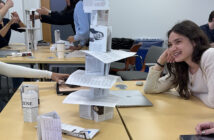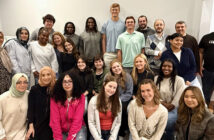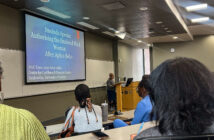Lehigh senior Alexander surveyed the room as the Physics 2 teaching assistants distributed the first examination of the semester.
Pen clicking. Leg bouncing. Nail biting.
The scene was all too familiar to Alexander as he’d been in the shoes of his sophomore classmates many times before. He used to wither from the intense stress. He used to feel the hopelessness. He used to accept failure before writing his name on the page.
But today, he wasn’t feeling those things — he was only feeling confident.
—
Alexander, an industrial and systems engineering major who has chosen to use a pseudonym for this story, had already failed this test and course before during his sophomore year. He was too proud to ask for help from his professors, so he let his stress consume him, along with his GPA. Three years, two repeated courses and one case of extreme self-disappointment is what it took for him to swallow his pride and seek academic support for the first time ever at Lehigh.
Two months ago, Alexander was connected to a graduate student physics tutor through the Center for Academic Success, and he said he already notices a significant improvement.
According to research conducted by assistant professor of psychology Christopher Burke, Lehigh’s competitive culture fosters a stigma attached to asking for academic help. This negative connotation causes many students to suffer independently or self-medicate with “study drugs,” rather than seek support from Lehigh’s readily available academic support programs.
Lehigh boasts a selective recruiting process as a result of being commonly regarded as a top research university. Lehigh students excelled in high school and managed to graduate at the top of their classes. However, when many of these high-strung students are introduced to Lehigh’s competitive academic and strong social cultures upon their first year, they become overwhelmed with stress that impedes on their academic success.
According to Lehigh’s Health Advancement and Prevention Strategies Office, in spring 2014, 30.4 percent of Lehigh undergrads reported that stress affected their individual academic performance. This is substantially higher than the 19.7 percent of college students nationwide who reported this in 2012 and 2013, according to the American College Health Association.
“We’re all competing for top jobs here,” Alexander said. “There’s really a lot of pressure. And everybody wants to prove that they can be successful on their own.”
Alexander said he has watched many of his friends struggle academically.
“The sad thing is, I still don’t think they would even consider asking for help from a tutor,” he said. “Even after seeing how much happier and less stressed out I am from it.”
Kelly Grim is the director of the Center for Academic Success at Lehigh, which provides peer tutoring services, as well as study skills resources and assistance for students. She said it is important for students to take advantage of the university’s resources to reduce stress.
According to Grim, during the 2013-2014 academic year, 18 percent of undergraduate students used some form of service offered by the Center for Academic Success. Of these participants, 44 percent were first-year students, reflecting the utilization of the center’s first-year residence hall on-location tutoring program, which was initiated in 2012.
However, Grim hopes that more upperclassmen will participate in the center’s programs in the future. She is working to better market their services in order to attract students who could use the support but might be too afraid to ask for it.
“I’ve just tried to shift the way we think about the support we’re offering and the language we use,” she said. “Smart, successful people take advantage of resources. If we could get Lehigh students to see that, and I think that’s an easier sell than, ‘If you need help with something, you should ask for that help,’ because that just sounds bad. And it makes them feel insecure and that they may be weak.”
Alexander is just one of the center’s success stories. According to Grim, almost all students who have used their tutoring services self-report that their understanding of the course material increased drastically.
Then why are so many students choosing to struggle instead of seeking help?
“People reject needing help and asking for help out of fear of losing control or appearing weak,” Burke said.
Much of his research looks at what predicts whether or not people will ask for help, as well as how people respond to getting help.
Burke said Lehigh should work harder to convey the importance of students seeking help when they’re struggling. He said there is an unnecessary shaming associated with needing help. He has found that first-year students especially struggle with admitting they need help.
“The first-year transition is so difficult at Lehigh because these poor kids, who are so used to excelling, are hit with a ton of bricks,” he said. “They arrive here, and suddenly they’re struggling with stuff they’ve never dealt with before. Many of these students just aren’t mentally prepared for the college experience yet.”
Burke said many first-year students choose to experiment with drugs to enhance their academic performance instead of utilizing university resources.
Rose, a Lehigh junior who wishes to use a pseudonym for this story, said she felt she was not adequately prepared for college when she arrived. She resorted to self-medicating with Aderrall, a prescription amphetamine medication used to treat attention deficit hyperactivity disorder, also known as ADHD and narcolepsy.
“It keeps me up, alert and motivated to get my work done,” she said. “Whenever I take it, I’m much more productive and can stay at the library for hours.”
According to the National Survey on Drug Use and Health, Aderrall is the most popular illicit study drug, with 34.5 percent of college students admitting to using it in 2012.
Rose said she first tried Aderrall while she was a first-year student. She was frustrated after receiving consecutive failing grades in her calculus course and was determined to improve.
“I was too scared to admit I needed math help,” she said. “I didn’t want to admit it to myself, and I thought I would be letting my parents down.”
Rose is not prescribed Aderrall. Self-medication of the drug is illegal and dangerous, according the National Institute on Drug Abuse. The Everyday Health website says risks associated with Aderrall abuse include seizure, stroke, heart attack, mood swings and depression.
The institute says students who abuse study drugs are not learning how to improve their study skills, rather they are altering the chemical activity in their brains to aid in their study.
“I just don’t understand how so many Lehigh students would rather mess with their health to succeed academically than receive real effective support from faculty,” Grim said. “College is a time where you are supposed to be preparing for a successful professional future.”
Grim said she prefers to focus her efforts on the students, like Alexander, that do reach out for help.
—
Just before Alexander was handed his exam, he looked up one last time and noticed a room full of students with pained expressions.
He felt bad for them.






Comment policy
Comments posted to The Brown and White website are reviewed by a moderator before being approved. Incendiary speech or harassing language, including comments targeted at individuals, may be deemed unacceptable and not published. Spam and other soliciting will also be declined.
The Brown and White also reserves the right to not publish entirely anonymous comments.
1 Comment
Your article has some valid points, exam stress is caused by bad preparing OR students who don’t KNOW how to prepare for exams.
What most people don’t realize is that studying and learning should never be too difficult. I’m sure I don’t have to tell you what it’s like. You know the feeling: you go to class, get a ton of homework, then spend hours and hours reading over your notes, trying to memorize everything in a mad panic before your next exam.
Not only is this stressful, but studying this way is both time consuming and a huge waste of energy. But the good news is, studying doesn’t have to be this difficult.
Please watch my video about effective studying:
Effective Studying